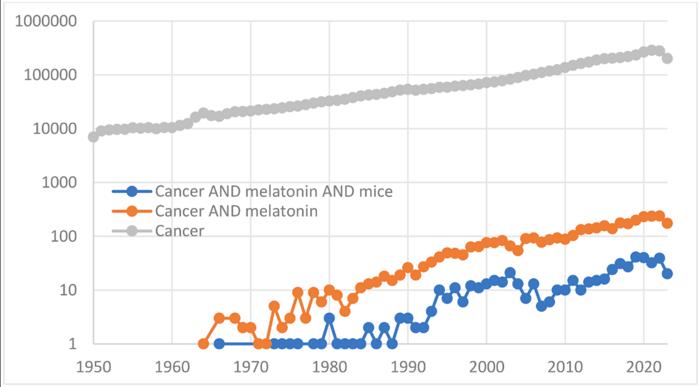“[…] murine models proved to be valuable and, in some cases, indispensable for advancing melatonin applications in oncology […].”

Credit: 2023 Anisimov and Golubev
“[…] murine models proved to be valuable and, in some cases, indispensable for advancing melatonin applications in oncology […].”
BUFFALO, NY- December 18, 2023 – A new research perspective was published in Oncotarget’s Volume 14 on December 12, 2023, entitled, “Melatonin and carcinogenesis in mice: the 50th anniversary of relationships.”
Fifty years ago, in 1973, Vladimir N. Anisimov and coauthors demonstrated for the first time an inhibitory effect of the pineal gland hormone melatonin on cancer in vivo, namely on transplantable mammary tumors in mice. Subsequently, it was shown in a number of studies that melatonin administration with drinking water at night inhibits chemically induced mammary carcinogenesis in mice and rats.
On the contrary, maintaining female mice and rats under round-the-clock lighting conditions, which suppresses the nighttime production of melatonin, stimulates spontaneous and chemical carcinogen-induced mammary tumor development.
As of today, the query “cancer AND melatonin AND mice” in Pubmed returns about 550 entries. In this new research perspective, researchers Vladimir N. Anisimov and Alexey G. Golubev from N.N. Petrov National Medical Research Center of Oncology outline the history of studies of melatonin effects on cancer in mice, with the main lesson being that the systemic in vivo effects of melatonin on animals may overwhelm the in vitro effects found using tissue explants or cell cultures.
“In particular, the timing of melatonin administration is of crucial importance for using the drug, which is freely available over [the] counter and thus needs no licensing for its applications in oncology.”
Read the full paper: DOI: https://doi.org/10.18632/oncotarget.28537
Correspondence to: Vladimir N. Anisimov
Email: [email protected]
Keywords: cancer, melatonin, mice
About Oncotarget: Oncotarget (a primarily oncology-focused, peer-reviewed, open access journal) aims to maximize research impact through insightful peer-review; eliminate borders between specialties by linking different fields of oncology, cancer research and biomedical sciences; and foster application of basic and clinical science.
To learn more about Oncotarget, visit Oncotarget.com and connect with us on social media:
- X, formerly known as Twitter
- YouTube
- LabTube
- Soundcloud
Sign up for free Altmetric alerts about this article: https://oncotarget.altmetric.com/details/email_updates?id=10.18632%2Foncotarget.28537
Click here to subscribe to Oncotarget publication updates.
For media inquiries, please contact: [email protected].
Oncotarget Journal Office
6666 East Quaker Str., Suite 1A
Orchard Park, NY 14127
Phone: 1-800-922-0957 (option 2)
###
Journal
Oncotarget
DOI
10.18632/oncotarget.28537
Method of Research
Literature review
Subject of Research
People
Article Title
Melatonin and carcinogenesis in mice: the 50th anniversary of relationships
Article Publication Date
12-Dec-2023




